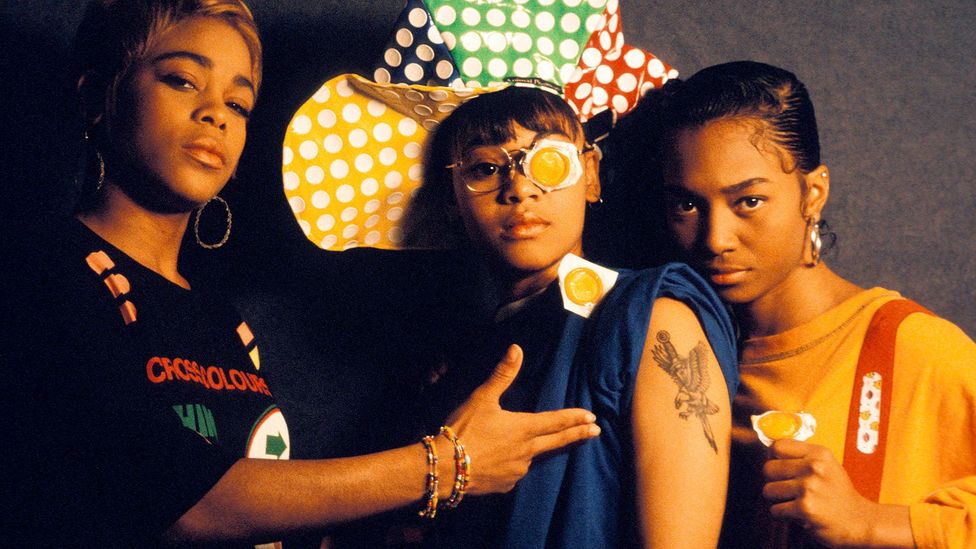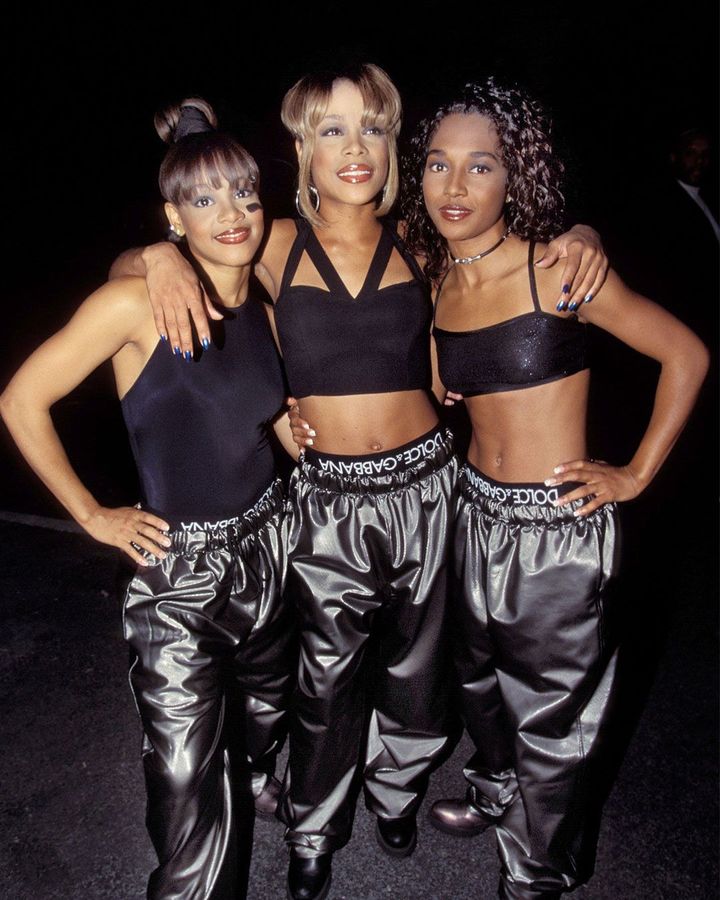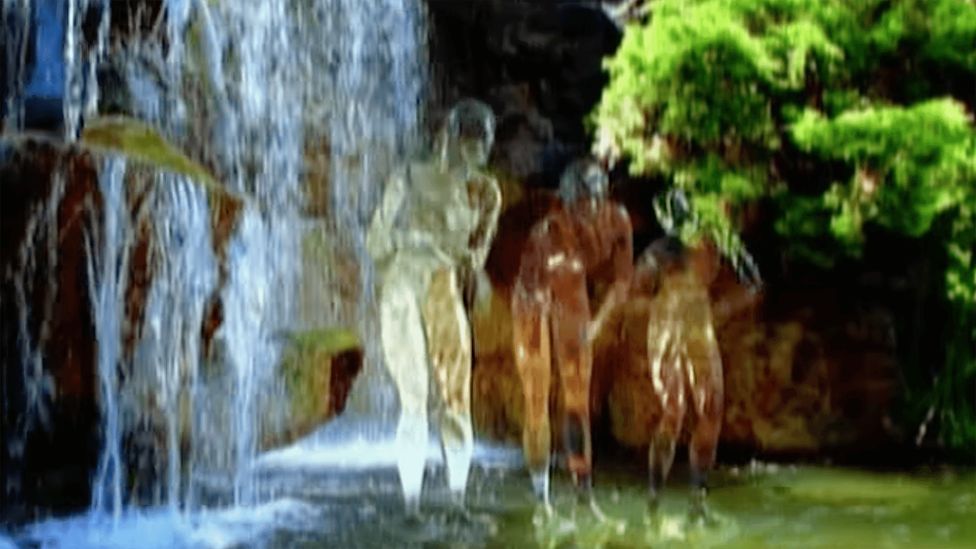The unexpected message in TLC’s Waterfalls

In the mid-1990s, one of the world’s brightest bands was boldly changing the conversation around safe sex, HIV and Aids. Award-winning Atlanta-based trio TLC (comprising Tionne “T-Boz” Watkins, Lisa “Left Eye” Lopes and Rozonda “Chilli” Thomas) released their signature track in 1995: Waterfalls, taken from their second album, CrazySexyCool.
More like this:
– The real meaning of Swift’s song Slut
– Should we bring singers back from the dead?
– The extraordinary influence of Madonna
Waterfalls is a characteristically smooth flow of R&B and hip hop, co-written by producers Organised Noize and Marqueze Etheridge with Lopes. The song’s structure brilliantly showcases TLC’s respective vocal talents: Watkins’s husky narratives; Thomas’s sweet harmonising; Lopes’s wryly snappy rhymes. Its theme is cautionary – a warning against pursuing self-destructive desires – and its tone remains vitally empathetic and non-judgemental. In the first verse, a “lonely mother” is helpless as her beloved son is lost to the drug trade. In the second, we hear of a man whose “natural obsession for temptation” leads to unprotected sex and a sobering conclusion: “three letters took him to his final resting place”.
“We wanted to make a song with a strong message – about unprotected sex, being promiscuous, and hanging out in the wrong crowd,” Thomas explained in a 2018 interview with The Guardian. “The messages in Waterfalls hit home. I think that’s why it’s our biggest hit to date.”

Lopes told the LA Times in 1992 that ‘The point is to make condoms something kids aren’t afraid of or ashamed of’ (Credit: Getty Images)
The startling, soulful expression of Waterfalls also felt entirely natural for TLC. The trio had always been exuberantly upfront about safe-sex messaging and sexual enjoyment, which made them dazzle amid an uptight mainstream. As a teen, I was thrilled (and a little shocked) to discover TLC’s 1992 breakthrough single, Ain’t 2 Proud 2 Beg, where the trio wore multi-coloured condoms as accessories, with Lopes wearing one in the lens of her glasses. “I consider myself a visionary, a conceptualist,” Lopes would later explain in a 1998 interview with Mad Rhymes magazine. “The bright colours, the condoms, all of the little things added something.”
Hard-hitting truths
TLC’s playful details always highlighted hard-hitting truths, including the fact that HIV disproportionately affected black and Latin American communities. In the year that Waterfalls was released, there were approximately 50,000 deaths among people with Aids in the US; according to an HIV/Aids Surveillance Report published by the US Department of Health and Public Services, “In 1995, blacks and Hispanics represented the majority of cases among men (54 per cent) and women (76 per cent).”
TLC are now the focus of a new documentary feature that recently made its UK premiere at the Doc ‘N’ Roll Film Festival. “TLC Forever was a project that fulfilled all of my childhood dreams,” smiles filmmaker and music fan Matt Kay. “Speaking to so many people, there was a lot of respect for TLC’s originality, for the ethos and artistry of what they created. And so I feel I gained a new appreciation for that, as well.”

TLC is the best-selling American girl group of all time, selling more than 65m records (Credit: Getty Images)
TLC Forever illustrates the enduring bond between the group members; there are new perspectives from Watkins and Thomas, and even Lopes (who tragically died in a car crash in 2002) feels vividly present in the film, through archive footage and interviews. The documentary also relates the challenges that they faced as young women, in the music industry and across their personal lives: Lopes was sentenced to probation in 1994 after a fight with her boyfriend resulted in a house fire, with the judge ordering her to undergo treatment for alcohol abuse and counselling for victims of domestic abuse. Despite the significant success and acclaim that they’d earned, poor contract terms meant that TLC would file for bankruptcy in summer 1995, while Waterfalls was an international smash hit.
Decades on, and following crucial advances in the treatment of HIV, Waterfalls has lost none of its insistent, emotive power. The song’s reach helped to shift public discourse around safe sex, HIV and Aids awareness away from the scaremongering and homophobia of the 1980s, into an era that was more candid and compassionate. Outspoken pop culture artists like TLC (and others such as Madonna, Prince, and Frankie Goes to Hollywood) – and dedicated organisations such as Red Hot and the Terrence Higgins Trust – were absolutely pivotal to social and political progress.
Using their platform
“It’s just the influence that artists can have in that position,” says Kay. “Some people can shy away from it, but TLC whole-heartedly embraced it, and knocked it out of the park. It’s their originality and earnest nature, coming from a place of care and what they thought was important, despite knowing that they could get backlash from many circles. Their fearlessness wasn’t just a fad; it was something that they really stood for, and continue to stand by. They were dressing how they wanted to dress and saying what they wanted to say.”
The impact of Waterfalls was also fuelled by its ground-breaking, multi-award-winning big-budget video (directed by F Gary Gray), which blended the song’s gritty scenarios with hyper-real effects, and the trio’s memorable dance moves: a shoulder-shrugging shimmy on shimmering water. “Waterfalls was one of the first tracks that really became iconic in terms of visually connecting with the subject matter, to show something that really enhanced the message,” says Kay.

Waterfalls topped the US charts for seven weeks; its video featured regularly on MTV, winning Video of the Year at the 1995 MTV Video Music Awards (Credit: TLC)
“Artists like TLC were using their platform to reach people in ways that even governments and politicians weren’t doing,” adds Andie Dyer, production manager at Terrence Higgins Trust. “The thing about empowering young women to carry condoms as well, to look after themselves – it’s amazing. I remember TLC’s Waterfalls video was on constant rotation on MTV. The video was so clever with its technology, but the actual story that it showed was like – wow. It was one of the first music videos to have a social narrative to it, very progressive. That’s quite commonplace now, but it was novel at the time.”
Waterfalls has inspired various cover versions from acts as disparate as Bette Midler, Death Cab for Cutie, and the celebrity judges of US TV competition The Voice, though the original remains inimitable and distinctly personal. “TLC were able to stay cutting-edge and fresh both sonically, and also through their messaging and style,” says Kay. “They never seem dated. TLC keep holding us to account and hopefully pushing those boundaries forward.”
Both Watkins and Thomas have continued to advocate for education around HIV and Aids, including via their spokesperson roles for the US initiative Dialogues, a programme that empowers patients with HIV information and self-care tools. As Watkins told The Guardian in 2018: “If I believe in something and want to talk about it, then that’s what we’re doing. I’m just so happy that we were able to succeed in what we set out to do – make a difference.”
The Lisa Lopes foundation, established shortly after Lopes’s death, still focuses on supporting disadvantaged youth. Her unforgettable lyrics for Waterfalls are devastatingly poetic, but also resound with a true love of life: “Dreams are hopeless aspirations, in hopes of coming true/ Believe in yourself, the rest is up to me and you.” That sense stays with us in TLC Forever, where we hear Lopes relating her journey from probation therapy to the studio where TLC were recording Waterfalls: “On the way, I was admiring the streets, the buildings, the trees, the sky, and I looked up and there was this rainbow. I just started reflecting on my life as if it was a storm… I wrote that song from my heart.”
TLC Forever is touring film festivals, and is available to stream online.
If you liked this story, sign up for The Essential List newsletter – a handpicked selection of features, videos and can’t-miss news delivered to your inbox every Friday.








